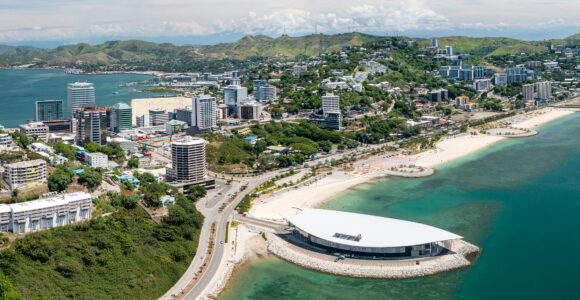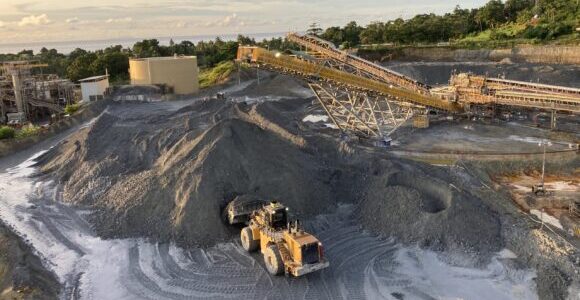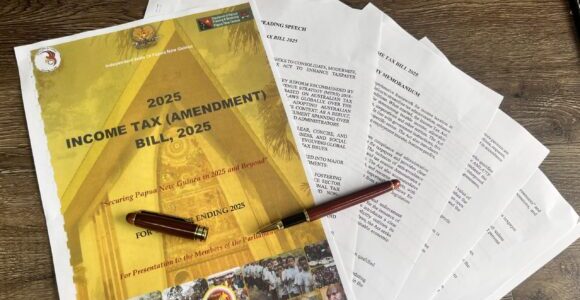Opinion: Proposed Papua New Guinea Land Act changes would harm investment, says Barker
The proposed amendments to Papua New Guinea’s Land Act are a cause for concern, argues the Institute of National Affairs’s Paul Barker. He says, if implemented, the legislation would scare off foreign investors at a time when the Government is looking for capital to encourage economic diversification.

The Institute of National Affairs’ Paul Barker
The proposed Land Act amendments are a considerable worry, especially when combined with the proposed, and very restrictive new reserved list under the new SME policy, some restrictions being pushed in agriculture, and the mammoth new Mining Act—all coinciding with low commodity prices and wider economic and governance issues in PNG.
As one long-standing overseas investor in PNG observed to me: ‘Everyone is wanting Foreign Direct Investment except North Korea, and I’m not sure that’s a good club for PNG to be joining!’
Much of PNG’s formal sector economic activity, employment and revenue is provided by foreign-owned or co-owned firms. They need some certainty and security, as well as positive prospective returns, to be able to stay and further invest.
In difficult times especially, it is the long-established firms here that continue to invest when newcomers shy away.
Economic growth and employment will be badly forestalled if overseas investors are driven out, by loss of access to IPA registration or State leases (both new and existing). Local businesses will not suddenly thrive on the back of the foreclosure of overseas-owned businesses.
Dissatisfaction
That said, it is understandable that there is wide public dissatisfaction with many overseas businesses that operate in an unregulated sector. Often they do not pay minimum wages, taxes or duties. Some are even operating in the already-restricted cottage industries. These latter businesses do provide a service, but they also squeeze out local business opportunities.
‘Corruption in land administration has been highlighted as one of the major impediments to buiness and investment.’
But, in these cases, it is more a case of applying existing laws, rather than introducing new rules.
Land Act
Specifically on the Land Act amendments, this was being pushed through hurriedly. The State Solicitor urged wider prior consultation with affected stakeholders before he issued a Certificate of Necessity.
There are certainly issues that need to be addressed with land laws and administration: not least revoking the large list of Special Agricultural and Business Leases (SABLs) grabbed illegally from customary landowners—notably without their consent—over the past decade. Also, the lack of a reliable and accessible land registry is a major issue.
But the Land Act amendment must be considered far more comprehensively and in coordination with related land legislation, including the Land Group Incorporation Act and the clauses over Forest Clearance Authorities (FCAs) under the Forest Act.
‘Removing the right of foreign businesses and individuals to hold State lease title may release some land on the market, but it will further undermine investment.’
Illegal SABLs cannot simply be legitimised retroactively by redesignating them under another piece of legislation. Corruption in land administration has been highlighted as one of the major impediments to business and investment in the Institute of National Affairs and Asian Development Bank’s periodic survey on PNG’s business environment.
Undermining investment
Removing the right of foreign businesses and individuals to hold State lease title may release some land on the market, but it will further undermine investment, including the capacity of businesses to hold or develop other capital assets, or secure project finance.
‘Hitting the already beleaguered private sector now with a deluge of further restrictions, whether or not they’re applied, is not the way to go for PNG.’
The government could consider restrictions on some types of land or property investment, such as in old, rather than new, real estate—as in Australia (in theory, at least). This should be carefully considered, with thoughtful proposals raised with Government.
But hitting the already beleaguered private sector now with a deluge of further restrictions, whether or not they’re applied, is not the way to go for PNG and its population of young people who are seeking jobs and economic opportunities.
This is especially the case when the Government is also saying, in various policy documents, that it is seeking economic diversification in order to move away from an over dependence on the volatile, and temporary, resources sector.
Paul Barker is the Executive Director of the industry-funded think tank, the Institute of National Affairs.






